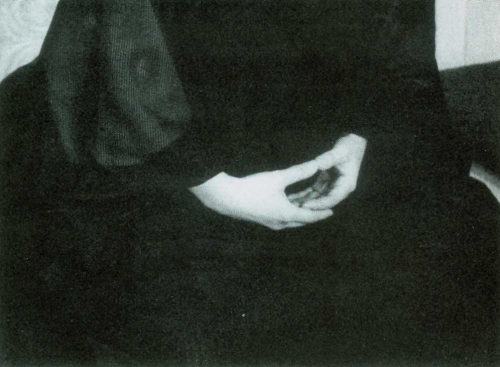What we call “I” is just a swinging door which moves when we inhale and when we exhale.
When we practice zazen our mind always follows our breathing. When we inhale, the air comes into the inner world. When we exhale, the air goes out to the outer world. The inner world is limitless, and the outer world is also limitless. We say “inner world” or “outer world,” but actually there is just one whole world. In this limitless world, our throat is like a swinging door. The air comes in and goes out like someone passing through a swinging door. If you think, “I breathe,” the “I” is extra. There is no you to say”I.” What we call “I” is just a swinging door which moves when we inhale and when we exhale. It just moves; that is all. When your mind is pure and calm enough to follow this movement, there is nothing: no “I,” no world, no mind nor body; just a swinging door.
So when we practice zazen, all that exists is the movement of breathing, but we are aware of this movement. You should not be absent-minded. But to be aware of the movement does not mean to be aware of your small self, but rather of your universal nature, or Buddhanature. This kind of awareness is very important, because we are usually so one-sided. Our usual understanding of life is dualistic: you and I, this and that, good and bad. But actually these discriminations are themselves the awareness of the universal existence. “You” means to be aware of the universe in the form of you, and “I” means to be aware of it in the form of I. You and I are just swinging doors. This kind of understanding is necessary. This should not even be called understanding; it is actually the true experience of life through Zen practice.
So when you practice zazen, there is no idea of time or space. You may say, “We started sitting at a quarter to six in this room.” Thus you have some idea of time (a quarter to six), and some idea of space (in this room). Actually what you are doing, however, is just sitting and being aware of the universal activity. That is all. This moment the swinging door is opening in one direction, and the next moment the swinging door will be opening in the opposite direction. Moment after moment each one of us repeats this activity. Here there is no idea of time or space. Time and space are one. You may say, “I must do something this afternoon,” bur actually there is no “this afternoon.” We do things one after the other. That is all. There is no such time as “this afternoon” or “two o’clock.” At one o’clock you will eat your lunch. To cat lunch is itself one o’clock. You will be somewhere, but that place cannot be separated from one o’clock. For someone who actually appreciates our life, they arc the same. But when we become tired of our life we may say, “I shouldn’t have come to this place. It may have been much better to have gone to some other place for lunch. This place is not so good.” In your mind you create an idea of place separate from an actual time.
Or you may say, “This is bad, so I should not do this.” Actually, when you say, “I should not do this,” you are doing not-doing in that moment. So there is no choice for you. When you separate the idea of time and space, you feel as if you have some choice, but actually, you have to do something, or you have to do not-doing. Not-to-do something is doing something. Good and bad are only in your mind. So we should not say, “This is good,” or “This is bad.” Instead of saying bad, you should say, “not-to-do”! If you think, “This is bad,” it will create some confusion for you. So in the realm of pure religion there is no confusion of time and space, or good or bad. All that we should do is just do something as it comes. Do something! Whatever it is, we should do it, even if it is not-doing-something. We should live in this moment. So when we sit we concentrate on our breathing, and we become a swinging door, and we do something we should do, something we must do. This is Zen practice. In this practice there is no confusion. If you establish this kind of life you have no confusion whatsoever.
Thank you for subscribing to Tricycle! As a nonprofit, we depend on readers like you to keep Buddhist teachings and practices widely available.
